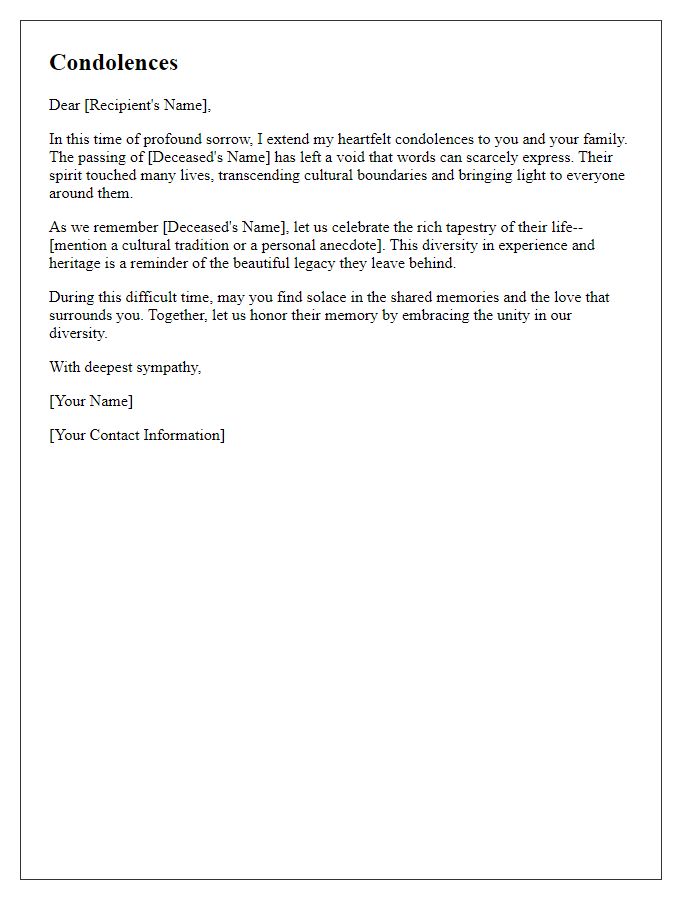When reaching out to someone during their time of grief, it's essential to express your condolences with heartfelt sensitivity and understanding of their cultural background. Each culture has its own traditions and customs surrounding mourning, so taking the time to acknowledge these can provide great comfort. A well-crafted condolence letter can not only convey your sympathies but also resonate deeply with the bereaved, honoring their unique experience. If you're interested in learning more about writing a culturally sensitive condolence message, keep reading for helpful tips and templates.

Personalization and Relationship Acknowledgment
A heartfelt condolence message recognizes a profound loss and offers support. It may include personalized anecdotes reflecting cherished memories shared, such as family gatherings or significant life events. Acknowledge the relationship with the deceased, emphasizing their positive impact on the community, highlighting their kindness, or celebrating achievements like education or career milestones. Incorporate cultural elements respectfully, identifying mourning customs, rituals, or symbolic gestures significant to the bereaved, such as lighting candles or offering prayers. Such sensitivity fosters connection and compassion, demonstrating true understanding of the grieving process.
Cultural and Religious Sensitivity
Cultural and religious sensitivity is essential when expressing condolences, especially in diverse communities. Different cultures may have unique customs surrounding mourning, such as specific rituals, prayer practices, or periods of grief. In many Asian cultures, for example, family gatherings during a wake signify respect and support. In Jewish traditions, sitting shiva (a seven-day mourning period) allows family to receive comfort from friends. Muslim communities may prefer condolences expressed through shared prayers or the phrase "Inna lillahi wa inna ilayhi raji'un" (Indeed, to Allah we belong and to Him we shall return). Understanding these nuances promotes compassion and connection, allowing for more meaningful expressions of support amid loss. Respecting dietary restrictions, dress codes for mourning, and preferred methods of communication further demonstrate empathy and acknowledgment of the grieving family's beliefs and practices.
Expression of Sympathy and Support
The passing of loved ones evokes profound sorrow within communities and families. Understanding cultural nuances surrounding grief is essential for conveying support and sympathy. In many cultures, practices such as wake rituals, memorial services, and communal gatherings, offer a space for mourning in specific traditions like Hindu ceremonies or Roman Catholic masses. The significance of honoring the deceased through rituals, like lighting candles or offering prayers, speaks to the collective memory of the departed. Gestures such as offering food or sending floral arrangements often symbolize care and connection during this difficult time, reinforcing bonds within the community. Respect for the individual's beliefs and customs, from Buddhist meditation practices to Islamic mourning periods, demonstrates empathy and understanding during periods of loss and reflection.
Respectful Language and Tone
A heartfelt expression of condolence during a time of loss is paramount. Grief can manifest differently across various cultures, making it essential to approach communication with sensitivity and respect. The words chosen should evoke a sense of empathy and understanding while acknowledging the significant emotional journey the bereaved is experiencing. Phrases that convey support, remembrance of the deceased's life, and reassurance of solidarity can provide comfort. It is also essential to honor any cultural practices or traditions surrounding mourning, which vary widely, from public displays of grief to private reflections, ensuring the message aligns with the recipient's customs and beliefs.
Offer of Assistance and Comfort
In times of profound sorrow, such as the loss experienced by families, the importance of cultural sensitivity cannot be understated. Offering support during mourning is vital. Many communities, like the Jewish practice of sitting Shiva, value communal presence and shared memories. Providing assistance, such as cooking meals, can be a gesture of compassion. Locations, such as local places of worship, often serve as gathering spots for grieving families. Understanding unique customs, like the Asian tradition of honoring ancestors, allows for respectful communication. Expressing heartfelt condolences alongside action, like sending flowers or offering help with arrangements, fosters connection and comfort during such challenging times.
Letter Template For Condolence Message With Cultural Sensitivity Samples
Letter template of empathetic expressions of sorrow with cultural sensitivity

Letter template of comforting words for bereavement with cultural mindfulness












Comments